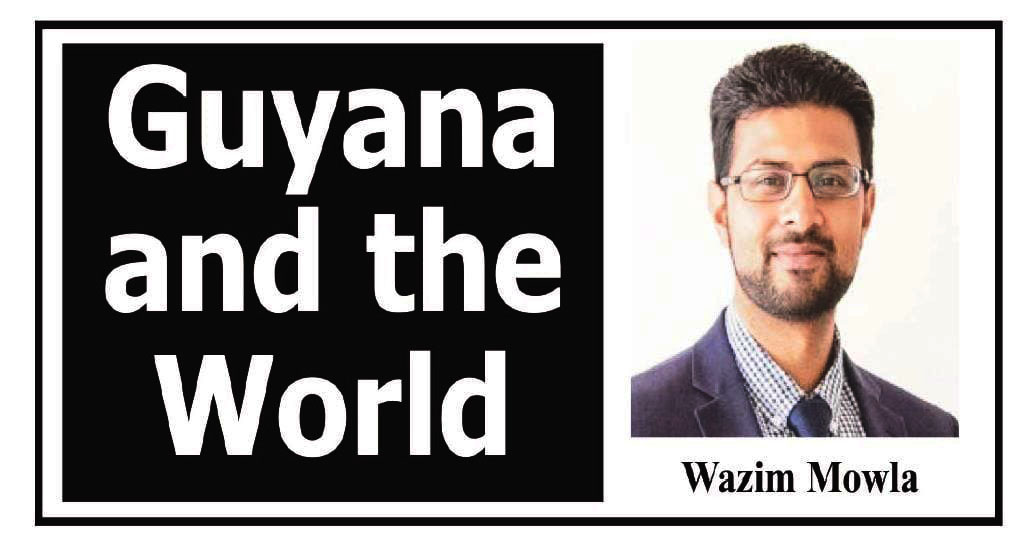President Irfaan Ali landed in Washington DC this week for a three-day visit to meet with government officials, private sector leaders, and other important stakeholders. Trips to Washington are becoming a regular occurrence and each time President Ali lands, the fanfare grows. Guyana’s rise in the international system is becoming less and less a secret, and policymakers and business leaders are increasingly turning their eyes to Guyana. But with attention from US stakeholders growing, how can Guyana maximize and benefit from it over the long-term? What does a Guyanese strategy to the United States look like?
Building a strategy to engage with the United States is complex. The country is home to bureaucratic federal agencies, partisan politics in the US Congress, a dynamic private sector, and large concentrations of the Guyanese diaspora. Further, the United States has a foreign policy that spans the world, meaning that countries such as Guyana often fight for position with policymakers from other nations. And the business community, especially larger companies, tend to enter bigger markets where labor, materials, and access to finance is cheaper. Navigating these nuances for any country is challenge, but for Guyana it will be important if we are to capitalize on our relationship with the United States.
First, Guyana should differentiate how it engages with US presidential administrations and members of the US Congress. There are benefits and downsides to both but strengthening congressional relationships should be the priority. Working with the US government, particularly across different administrations is a challenge. With four-year terms that are capped at two, US presidents always have re-election in mind, meaning that domestic politics and interests often win out against foreign policy goals. Also, specific policies from one administration do not survive the next administration. This has been clear looking at US policy to the Caribbean. The Obama, Trump, and Biden administrations all had different Caribbean policies, meaning that Guyana and the rest of the region had to restart and re-learn how to engage with each presidential administration.
Working with the US Congress provides longevity for Guyana’s relationships. Yes, congressional members must be re-elected but there are no term limits. Some members have been in office for decades. And while they, probably more than US presidential administrations, are subject to the whims of their domestic constituencies, it is easier to work through and around the nuances of a congressional district than an entire nation. This allows for Guyanese policymakers to have targeted approaches and strategies for engaging with members of Congress that can remain relevant and stable for decades.
Engaging with the US private sector holds the most upside of any Guyanese strategy to the United States. Guyana’s development will not be sustainable without a robust and experienced private sector. Local content policies will ensure that the private sector reaps the benefits of increased foreign investment but the transition to a self-sufficient Guyanese private sector should be the end goal. The world is growing smaller, with western countries developing industrial policies that prioritize domestic companies and their competitiveness vis a vis counterparts operating in global markets. Guyana’s private sector needs to be set up for success in the long-term and the expertise and knowledge that can be transferred from US to Guyanese companies is critical, including access to new technologies across the clean energy, agriculture, and manufacturing sectors.
Finally, messaging is important. Guyana’s perception can either aid or strangle relationships across the US Congress and the business community. Guyana’s oil and gas wealth is notable in Washington but less is known about the country’s preservation of its forests, its capabilities in the agriculture sector, and its growing transition to low-carbon energies. Messaging via public diplomacy is useful. It is a strategy the United States employs. In-country ambassadors frequently speak to media and policymakers brand aid and assistance that they export to partner countries. Take the US Fulbright program or the Peace Corps as examples. US citizens travel to other countries to engage in research and work with locals that indirectly spreads US messages about culture and politics. Here, Guyana can take advantage and use this strategy by working closer with US media, think tanks, and universities. President Ali’s visit to the Atlantic Council during his visit to Washington is a prime example, where he will be able to share a vision about Guyana that goes beyond oil wealth.
With this in mind, Guyana’s government should consider creating a commission that develops a detailed and long-term strategy on how the country should engage with the United States. There should be three key tenets included, such as (1) engagement with the US Congress; (2) how to facilitate investment and knowledge sharing from US companies; and (3) developing a public diplomacy arm that shapes messaging around Guyana in the United States. The commission should be jointly led by the Guyanese government, members of parliament, the private sector, and the University of Guyana, among others.
The United States will continue to be an important partner for Guyana. US investment will be crucial for Guyana’s development and the US government can be an ally for us in international platforms. Equally important is the perception of Guyana. Despite our global rise, Guyana is still a relatively unknown quantity in most circles. As this changes, we need to help guide the change. A long-term strategy can cement the US-Guyana relationship and consistently identify areas of cooperation with US stakeholders.
*Wazim Mowla is a Guyanese American and the associate director of the Atlantic Council’s Caribbean Initiative in Washington DC. Mowla is also a senior consultant with ACE Consultancy and a non-resident scholar with Florida International University’s Jack D. Gordon Institute for Public Policy.






